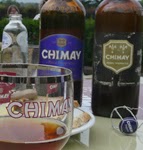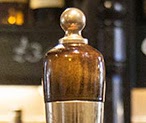Hops A-Z; X is for Xanthohumol
I touched on xantholhumol in an earlier article and I think it deserves to be discussed at further length. Mainly because I can't think of anything else to write about related to hops that begins with the letter X.
A prenylated flavonoid (that is, one insoluble in water, I think), xantholhumol (herefafter 'X') is only found in hops and is attracting much attention from both the brewing and medical professions. Flavonoids in general have antioxidant characteristics; studies of X have shown it has more antioxidants than Vitamin E.
A whole host of medical benefits have been ascribed to X, such as slowing/stopping tumour growth, being anti-viral and anti-inflammatory. Discovered in 1913 and identified as a potential anti-cancer agent in the 1990s at Oregon State University, X is seen by some researchers as a 'golden bullet' that could form the basis of super-drugs or diet supplements.
Not that it's easy to make the most of it, mind. X makes up around 1% of total hop weight. Like many hop products, up to 90% of X volume is lost through the brewing process. And when it isomerises (to, you guessed it, iX) it's less effective - although recent studies suggest that the anti-inflammatory effect of iX may be greater than X itself. As for the amount of X left in beer... estimates differ widely, but conservative figures suggest an individual would need to drink in excess of 25 litres of beer per day to ingest enough X to make a difference. By which time, they'd have more medical issues to worry about.
Perhaps the future of X in beer is concerned with optimising its level. Studies show that X is found in higher concentrations in darker beers such as stouts and porters, possibly as roasted barley may inhibit X's isomerisation. Test brews in Germany have achieved ten times the usual level of X in a beer but still has 'normal' calorie and alcohol levels.
Or maybe the future application of X lies outside of beer altogether. Rather than bolster the X level of beer through X-rich supplements, why not just use the supplements in other foodstuffs and/or medicines? That's something that Hopsteiner are keen to promote with their X-derived product Xantho-Flav.
It may just be that, if its medical potential is fully realised, xanthohumol could become the primary driver for world hop production. There's something to think about the next time you have a beer... if the medical demand corners the hop supply, will brewers be left with a gruit future?
A prenylated flavonoid (that is, one insoluble in water, I think), xantholhumol (herefafter 'X') is only found in hops and is attracting much attention from both the brewing and medical professions. Flavonoids in general have antioxidant characteristics; studies of X have shown it has more antioxidants than Vitamin E.
A whole host of medical benefits have been ascribed to X, such as slowing/stopping tumour growth, being anti-viral and anti-inflammatory. Discovered in 1913 and identified as a potential anti-cancer agent in the 1990s at Oregon State University, X is seen by some researchers as a 'golden bullet' that could form the basis of super-drugs or diet supplements.
Not that it's easy to make the most of it, mind. X makes up around 1% of total hop weight. Like many hop products, up to 90% of X volume is lost through the brewing process. And when it isomerises (to, you guessed it, iX) it's less effective - although recent studies suggest that the anti-inflammatory effect of iX may be greater than X itself. As for the amount of X left in beer... estimates differ widely, but conservative figures suggest an individual would need to drink in excess of 25 litres of beer per day to ingest enough X to make a difference. By which time, they'd have more medical issues to worry about.
Perhaps the future of X in beer is concerned with optimising its level. Studies show that X is found in higher concentrations in darker beers such as stouts and porters, possibly as roasted barley may inhibit X's isomerisation. Test brews in Germany have achieved ten times the usual level of X in a beer but still has 'normal' calorie and alcohol levels.
Or maybe the future application of X lies outside of beer altogether. Rather than bolster the X level of beer through X-rich supplements, why not just use the supplements in other foodstuffs and/or medicines? That's something that Hopsteiner are keen to promote with their X-derived product Xantho-Flav.
It may just be that, if its medical potential is fully realised, xanthohumol could become the primary driver for world hop production. There's something to think about the next time you have a beer... if the medical demand corners the hop supply, will brewers be left with a gruit future?





















Proof, if proof be need be, that beer is a superfood.
ReplyDelete